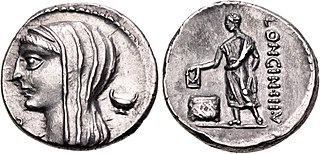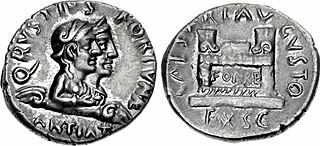Related Research Articles

The gens Furia, originally written Fusia, and sometimes found as Fouria on coins, was one of the most ancient and noble patrician houses at Rome. Its members held the highest offices of the state throughout the period of the Roman Republic. The first of the Furii to attain the consulship was Sextus Furius Medullinus in 488 BC.

The gens Atilia, sometimes written Atillia, was a plebeian family at ancient Rome, which rose to prominence at the beginning of the fourth century BC. The first member of this gens to attain the consulship was Marcus Atilius Regulus, in 335 BC. The Atilii continued to hold the highest offices of the state throughout the history of the Republic, and well into imperial times.

The gens Cassia was a Roman family of great antiquity. The earliest members of this gens appearing in history may have been patrician, but all those appearing in later times were plebeians. The first of the Cassii to obtain the consulship was Spurius Cassius Viscellinus, in 502 BC. He proposed the first agrarian law, for which he was charged with aspiring to make himself king, and put to death by the patrician nobility. The Cassii were amongst the most prominent families of the later Republic, and they frequently held high office, lasting well into imperial times. Among their namesakes are the Via Cassia, the road to Arretium, and the village of Cassianum Hirpinum, originally an estate belonging to one of this family in the country of the Hirpini.

The gens Aquillia or Aquilia was a plebeian family of great antiquity at ancient Rome. Two of the Aquillii are mentioned among the Roman nobles who conspired to bring back the Tarquins, and a member of the house, Gaius Aquillius Tuscus, was consul in 487 BC.

The gens Annia was a plebeian family at ancient Rome. Livy mentions a Lucius Annius, praetor of the Roman colony of Setia, in 340 BC, and other Annii are mentioned at Rome during this period. Members of this gens held various positions of authority from the time of the Second Punic War, and Titus Annius Luscus attained the consulship in 153 BC. In the second century AD, the Annii gained the Empire itself; Marcus Aurelius was descended from this family.

The gens Antistia, sometimes written Antestia on coins, was a plebeian family at ancient Rome. The first of the gens to achieve prominence was Sextus Antistius, tribune of the plebs in 422 BC.

The gens Axia, also spelled Axsia, was a plebeian family at Rome during the final century of the Republic and the beginning of the Empire. The gens does not appear to have been particularly large or important, although at least some of the family were reasonably wealthy.

The gens Memmia was a plebeian family at ancient Rome. The first member of the gens to achieve prominence was Gaius Memmius Gallus, praetor in 172 BC. From the period of the Jugurthine War to the age of Augustus they contributed numerous tribunes to the Republic.

The gens Maria was a plebeian family of Rome. Its most celebrated member was Gaius Marius, one of the greatest generals of antiquity, and seven times consul.
The gens Cosconia was a plebeian family at Rome. Members of this gens are first mentioned in the Second Punic War, but none ever obtained the honours of the consulship; the first who held a curule office was Marcus Cosconius, praetor in 135 BC.

The gens Cupiennia was a plebeian family at Rome. Members of this gens are first mentioned toward the end of the Republic. None of them achieved any great importance.

The gens Fonteia was a plebeian family at ancient Rome. Members of this gens are first mentioned toward the end of the third century BC; Titus Fonteius was a legate of Publius Cornelius Scipio during the Second Punic War. The first of the Fonteii to obtain the consulship was Gaius Fonteius Capito, consul suffectus in 33 BC.
The gens Gellia was a plebeian family at ancient Rome, where they settled after the Second Punic War. The first of the Gellii to obtain the consulship was Lucius Gellius Poplicola, in 72 BC, but the most famous member of this gens is probably the grammarian Aulus Gellius, who flourished during the second century AD.
The gens Maenia, occasionally written Mainia, was a plebeian family at ancient Rome. Members of this gens are first mentioned soon after the establishment of the Republic, and occur in history down to the second century BC. Several of them held the position of tribune of the plebs, from which they strenuously advocated on behalf of their order. The most illustrious of the family was Gaius Maenius, consul in 338 BC, and dictator in both 320 and 314. In some manuscripts, the nomen Maenius appears to have been erroneously substituted for Menenius or Manlius; there are also instances of confusion with Manilius, Maelius, and Maevius.

The gens Naevia, occasionally written Navia, was a plebeian or patrician family at ancient Rome. Members of this gens are first mentioned at the time of the Second Punic War, but the first of the Naevii to obtain the consulship was Lucius Naevius Surdinus, in AD 30.
The gens Mescinia was a minor plebeian family at Rome. None of its members held any of the higher magistracies, but Lucius Mescinius Rufus, perhaps the most famous of the gens, was quaestor under Cicero during the latter's administration of Cilicia. Other Mescinii are known from inscriptions.

The gens Opimia, also written Opeimia on coins, was a plebeian family at ancient Rome. Members of this gens are first mentioned during the time of the Samnite Wars, and they are mentioned in Roman historians from then down to the end of the Republic. The first of the Opimii to obtain the consulship was Quintus Opimius in 154 BC.

The gens Publicia, occasionally found as Poblicia or Poplicia, was a plebeian family at ancient Rome. Members of this gens are first mentioned in history during the period following the First Punic War, and the only one to achieve the consulship was Marcus Publicius Malleolus in 232 BC.

The gens Rustia was a minor plebeian family at ancient Rome. Members of this gens are first mentioned toward the end of the Republic, and a few of them achieved prominence in imperial times, with Titus Rustius Nummius Gallus attaining the consulship under Tiberius in AD 34.

The gens Saufeia was a minor plebeian family at ancient Rome. Members of this gens are first mentioned in the final century of the Republic, and from then to the early Empire their name occurs regularly in history, but none of them ever attained the consulship.
References
- ↑ Dictionary of Greek and Roman Biography and Mythology , William Smith, Editor.
- ↑ Joseph Hilarius Eckhel, Doctrina Numorum Veterum v. p. 205.
- ↑ Crawford, Roman Republican Coinage, p. 332, no. 333.
- ↑ Marcus Tullius Cicero, Philippicae iii. 3, 15, iv. 2, v. 19.
- ↑ AE 1933, 105
- ↑ PLRE, vol. 1, p. 230.
- ↑ CIL XIV, 4410, CIL XIV, 4412
- ↑ PLRE, vol. 1, p. 420.
![]() This article incorporates text from a publication now in the public domain : Smith, William, ed. (1870). Dictionary of Greek and Roman Biography and Mythology .Missing or empty
This article incorporates text from a publication now in the public domain : Smith, William, ed. (1870). Dictionary of Greek and Roman Biography and Mythology .Missing or empty |title= (help)
- Crawford, Michael H. (2001) [1974]. Roman Republican Coinage I. Cambridge University Press. ISBN 0-521-07492-4.
- PLRE – A.H.M. Jones & J.R. Martindale & J. Morris, The Prosopography of the Later Roman Empire , Cambridge University Press (1971–1992).